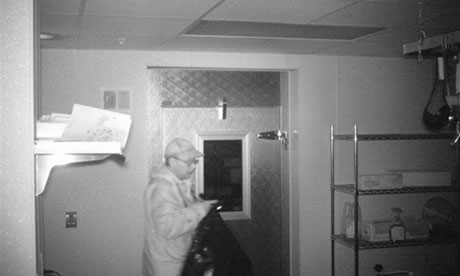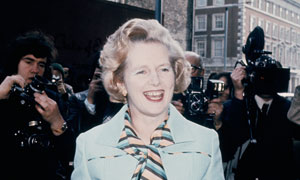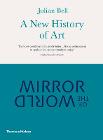Bharat Tandon on Mrs Bennet
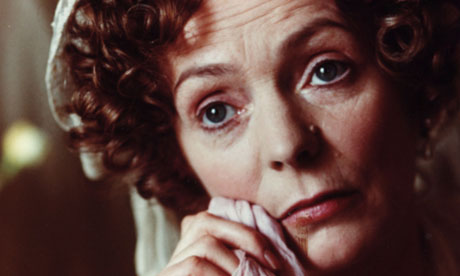 'A woman of mean understanding, little information, and uncertain temper' … Alison Steadman as Mrs Bennet in the 1995 BBC adaptation. Photograph: BBC
'A woman of mean understanding, little information, and uncertain temper' … Alison Steadman as Mrs Bennet in the 1995 BBC adaptation. Photograph: BBC
Read the opening chapter of Pride and Prejudice, and you might feel that there's nothing more to be said about Mrs Bennet. After all, Austen's narrator signs off her beautifully pitched dramatic exposition of Elizabeth's parents with something that sounds like a categorical declaration: "Her mind was less difficult to develope [sic]. She was a woman of mean understanding, little information, and uncertain temper. When she was discontented she fancied herself nervous. The business of her life was to get her daughters married; its solace was visiting and news." Indeed, had this been Austen's previous novel, Sense and Sensibility, there probably wouldn't be anything more to be said, since that story, at least in its early sections, is reassuringly direct and decided in its narratorial judgments.
Reread the beginning of Pride and Prejudice, on the other hand, and matters begin to seem far less clear cut. Take that famous opening sentence, for example: "It is a truth universally acknowledged, that a single man in possession of a good fortune, must be in want of a wife." Readers have long noted that, as a statement, it's far from "universal"; rather, it's a prime example of the technique, with which Austen experiments from the later parts of Sense and Sensibility onwards, of "free indirect style", in which characters' subjective opinions are presented as if they were external judgments. And after all, whose opinions are being presented here? The more one reads of what follows in the novel, the more it looks as if a chapter that closes with a putdown of Mrs Bennet might also begin with a sentence that channels her thoughts. Nor is this the only incident where the reader is obliged to take on Mrs Bennet's restricted views; compare the verdict on Darcy's standoffishness at his first public appearance: "His character was decided. He was the proudest, most disagreeable man in the world, and every body hoped that he would never come there again" (prominent among this "every body" being Mrs Bennet, of course).
Why, then, might Austen feel the need to let Mrs Bennet so far into the narrative texture of a novel that clearly sees her as an object of ridicule? Her track record in Pride and Prejudice is not great, given that she tries to strongarm Elizabeth into accepting the odious walking cliche that is Mr Collins, as well as encouraging the very flirtatiousness that results in Lydia's elopement with Mr Wickham (presumably because she sees in her air-headed youngest daughters a reflection of her own past self). One explanation, I think, can be found in Austen's employment of the word "business". In this light, Mrs Bennet can be seen not as an aberration within the world of Pride and Prejudice, but more as an excessive, pathological response to a genuine social grievance. For, to someone in Mrs Bennet's modest social and economic position, getting that many daughters married off would indeed have been a serious business – especially considering the institutionalised iniquity of a family inheritance entailed away from the female line of succession.
Austen's art as a whole is an extraordinary aesthetic response to a whole set of contemporary constraints and pressures, whether those pressures be sexual, economic, or simply the claustrophobic atmosphere of populated social spaces; and if Mrs Bennet is sometimes unbearable, she's also the symptom of larger causes that are even less bearable. Austen couldn't avoid them, nor does her fiction try to. And whatever else one might lay at Mrs Bennet's door, she sticks up for her daughters, as when she declares of Mr Bingley that "he used my daughter extremely ill … I am sure Jane will die of a broken heart, and then he will be sorry for what he has done". After all, who ever wanted their own mother to be impartial? You might not always want Mrs Bennet in your space, but there are worse people to have on your side.
Bharat Tandon is the author of Jane Austen and the Morality of Conversation (Anthem Press)
John Mullan on Mr Bennet
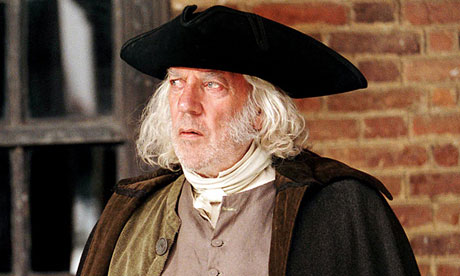 Satirical cove … Donald Sutherland as Mr Bennet in the 2005 film. Photograph: Rex Features
Satirical cove … Donald Sutherland as Mr Bennet in the 2005 film. Photograph: Rex Features
Everyone seems to love Mr Bennet, a satirical cove who relishes the follies of other characters. He's a master of the dry bon mot – who can forget his way of interrupting Mary's painful performance on the piano ("You have delighted us long enough. Let the other young ladies have time to exhibit")? But this shows us why we should think badly of him. He stops his daughter in her Suzuki-style, metronomic tracks, but his ironic barb amuses us at her expense. Everything is comedy to him. When Jane Bennet has her heart broken by Mr Bingley's sudden departure and subsequent neglect, Mr Bennet seems to think it is all a laugh. "Next to being married, a girl likes to be crossed a little in love now and then. It is something to think of, and it gives her a sort of distinction among her companions." The astute reader of Pride and Prejudice will reflect that even his droll ripostes are usually deplorable. "If my children are silly, I must hope to be always sensible of it." But not to do anything about it. He treats his younger offspring as objects of derision, but does nothing to improve their minds or their manners.
He married the idiotic Mrs Bennet because he found her sexy. He was "captivated by youth and beauty, and that appearance of good humour which youth and beauty generally give". Having discovered his error, he has retreated into mockery of his wife. From the very first chapter, he is teasing and tormenting poor, stupid Mrs Bennet. She is desperate that he should visit Mr Bingley, the new single man in possession of a good fortune, and Austen tells us that he had always intended to do so, "though to the last always assuring his wife that he should not go". It may be funny, but it is connubial torture. A psychologist would surely say that he is punishing her for his own folly in having been attracted to her in the first place. Late in the novel Elizabeth reflects that, because she is fond of her father, she has too often ignored "that continual breach of conjugal obligation and decorum which, in exposing his wife to the contempt of her own children, was so highly reprehensible".
Much turns out to be Mr Bennet's fault. On an income of £2,000 a year, he ought to have been able to build up a sizable inheritance for his daughters, but has entirely failed to do so. He simply trusted that he would eventually have a son, who would duly inherit the estate and its income; by giving him five daughters, providence has denied him this security and ensured that his cousin, Mr Collins, will get everything.
And in critical moments he likes to be absent. He does not bother to attend the assembly room ball, where Jane first meets Mr Bingley and Elizabeth is insulted by Mr Darcy. He is at home reading a book. When trouble brews and voices are raised, he retreats to his library, where none may enter without his permission. He knows that his youngest daughter, Lydia, is a silly flirt, so why did he let her go to Brighton – resort of all sinfulness – chaperoned only by a teenage friend? When disaster duly strikes, and Lydia runs off with a notable rake to live in sin somewhere in London, he is powerless. Such an intelligent man should have seen it coming. "It has been my own doing, and I ought to feel it," he tells Elizabeth after his fruitless search for Lydia. Dead right.
Zoe Williams on Elizabeth Bennet
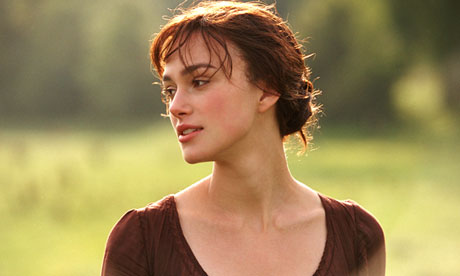 Feminist heroine … Keira Knightley as Lizzie Bennet in the 2005 film.
Feminist heroine … Keira Knightley as Lizzie Bennet in the 2005 film.
Jane Austen directs our sympathies like a Beijing traffic cop – balletic and graceful, she is also very firm and unambiguous, brooking no argument. There's really no room for Elizabeth Bennet to be anything other than a feminist heroine, having such a pert wit and lovely eyes, commanding our affections the way she does.
However, her relationship with Mr Bennet, so often seen as establishing and ratifying her status as the smartest and most interesting of the daughters, certainly complicates – if not pollutes – her standing as our narrator's ego ideal.
The marriage between the parents is just one union serving as a counterpoint to the love match that all the daughters so ardently, subversively desire. Mr and Mrs Bennet are ill‑suited, and Elizabeth operates as the father's ally in an essentially very uneven domestic civil war. Mrs Bennet has the ballast – the younger daughters and her own sheer energy for filling the air with noise – while Mr Bennet has the precision missiles: his sarcasm and the challenging aspect of Elizabeth, his dote. Their relationship is conspiratorial, playful in a sense, but allowing in no other players. Witness the arrival of Mr Collins: "His cousin was as absurd as he had hoped, and he listened to him with the keenest enjoyment, maintaining at the same time the most resolute composure of countenance, and except in an occasional glance at Elizabeth, requiring no partner in his pleasure."
The truth is that his pleasure does require a partner – since it resides in his feelings of superiority over the rest of his family, its levity depends on an audience. Without his second daughter, he would be alienated. She internalises this filial duty so completely as to take on herself a duty of despising her mother, and, by extension, all the women around her. When this is noted – "'Eliza Bennet,' said Miss Bingley, when the door was closed on her, 'is one of those young ladies who seek to recommend themselves to the other sex, by undervaluing their own; and with many men, I dare say, it succeeds. But in my opinion, it is a paltry device, a very mean art'" - the direction of the narrative would have us take this as evidence that Miss Bingley is a bit of a bitch. But she's also right. Eliza Bennet, excepting a fondness for her older sister that seems mainly habitual and sentimental, can't stand women. The only allegiance she can forge is with Darcy's sister, Georgiana, who is incredibly shy, large and homely-looking. Elizabeth has built so much of her identity upon deriding other women that the spectrum of female companionship she can cope with is extremely narrow. To be in her confidence, women have to be incredibly quiet, in other words – this prejudice of hers is much more limiting than her prejudice against Mr Darcy.
To be so scornful, it would help if she had excellent judgment, but instead it is poor – she ridicules Jane for her easy assumptions of everyone's goodness, but her own adjudications (Wickham good, Darcy bad) are erratic and muddled. She affects an arch carelessness to shore up her already established paternal approval; and yet she does care, so the act of surrender is both cowardly and inauthentic. Her rejection of traits that she perceives as feminine – the reservation of judgment, which she casts as indecisiveness – interferes with her wisdom, rendering it less than it could be.
I would never argue that a feminist had to be sisterly, any more than sisterliness does anything for feminism. Nevertheless, it is a tough call to find a feminist icon in a woman who hates her sex to please her father.
Sebastian Faulks on Mr Darcy
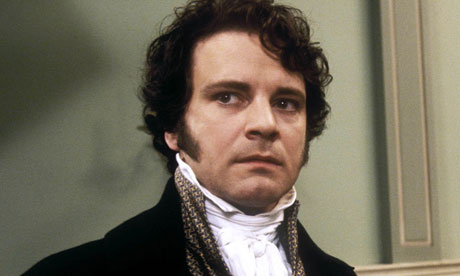 A man without shame … Colin Firth as Mr Darcy in the 1995 BBC adaptation. Photograph: Allstar/BBC
A man without shame … Colin Firth as Mr Darcy in the 1995 BBC adaptation. Photograph: Allstar/BBC
Mr Darcy may not be the first depressive to feature in an English novel, but he is almost certainly the first to be a romantic lead. This is a man without shame, whose shamelessness is made worse by the fact that he has intermittent access to good judgment. When he is without it, however, he is a manipulative, hypocritical, self-centred depressive, aware of some of his faults but unapologetic for them – bound by arrogance to ignore them because they are his, and therefore, by his definition, not really faults at all.
In her response to his second proposal, Elizabeth says brightly: "You must learn some of my philosophy. Think only of the past as its remembrance gives you pleasure."
Darcy's reply makes clear who he is – a man suffering from chronic depression, dwelling on the past, but unable to take responsibility for his own actions: "Painful recollections will intrude, which cannot, which ought not be repelled," he says; and it is the most revealing thing he says in the whole novel. He goes on to correct the servant, Mrs Reynolds's, account of his character and to confirm the darker views of Bingley and Fitzwilliam; but alas, for all he has learned from Elizabeth, he still cannot take responsibility for himself.
He blames his dead parents for "spoiling" him; he will not see that his character and actions have been for some years his own to shape. He is unhappy about himself, critical even, but is locked in a spiral with thoughts that "cannot, ought not to be repelled". He has, furthermore, no interests; he doesn't do anything. He will lend his fishing rods to Mr Gardiner but doesn't contemplate joining in the sport. In modern therapeutic terms, he needs to understand his own emotions more deeply, get to know himself, take exercise to release endorphins, abandon the protective persona ("beneath me") he has adopted and forgive himself for what he is and has been. There is much to forgive, much "work" to be done, and it is the sadness of the book that we suspect he will never be able to do it. When Elizabeth asks him why he was so silent on his last visit, when all seemed set fair between them, he says he was "embarrassed". Even she, all of whose defences are down as she heads for the altar, cannot let this go: "But tell me, what did you come to Netherfield for?" she asks in exasperated fondness. "Was it merely to ride to Longbourn and be embarrassed?"
It will be hard for her to accept that in her husband the lack of vital energy that underlies depression will always dominate the intermittent bursts of activity, the little upswings that punctuate his melancholy. All that Darcy can do now is marry Elizabeth, his lifelong Prozac in an Empire-line dress: dear, busy, middle-class Lizzy with her wit and common sense, who will be good at sex, kind to his sister and will laugh at his aunt. It is more, really, than he deserves for his single outburst of politeness and his periodic financial largesse.
Sebastian Faulks is the author of Faulks on Fiction (BBC Books)
PD James on George Wickham
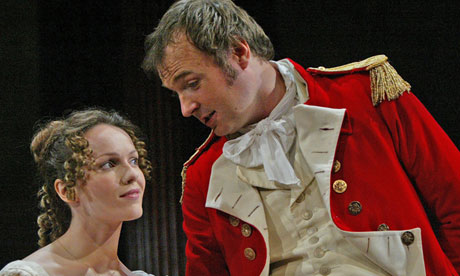 Christian gentleman … John Leslie as Mr Wickham at the Yvonne Arnaud theatre in 2005. Photograph: Alastair Muir/Rex Features
Christian gentleman … John Leslie as Mr Wickham at the Yvonne Arnaud theatre in 2005. Photograph: Alastair Muir/Rex Features
"Mr Wickham senior, the highly regarded steward of the late Mr Darcy, was fortunate in his son George, who throughout his life was a child of whom any father could be proud. George was brought up with Fitzwilliam, the heir of Mr Darcy of Pemberley, a spoilt and ill-tempered boy with little regard for the future responsibilities of his privileged life. It was George Wickham who, in Darcy's youth, by personal example and precept largely helped to keep him out of trouble. Wickham became ordained straight from Oxford, as was his ambition, and having inherited a rich country living from the late Mr Darcy, served faithfully for three years as a well-loved pastor to his parishioners, while Fitzwilliam Darcy sank into dissolution and disgrace by seducing the five daughters of a Mr and Mrs Bennet of Longbourn.
But the Reverend Mr George Wickham's abilities were soon recognised and eventually he rose to a bishopric and was revered as the very model of a Christian gentleman. He married the daughter of a wealthy churchman but money was never important to him. His old age was blessed with numerous grandchildren and he was buried in his own cathedral, where an impressive marble tomb bears witness to a long life lived always in the service of others …"
PD James is the author of Death Comes to Pemberley (Faber & Faber)
Paula Byrne on Lydia Bennet
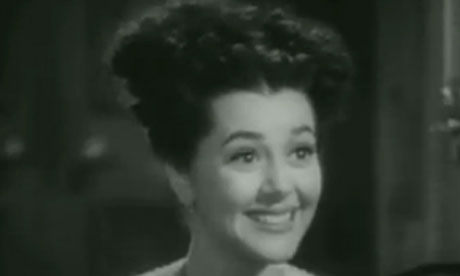 'Good humour and good spirits' … Ann Rutherford as Lydia Bennet in the 1940s Pride and Prejudice film
'Good humour and good spirits' … Ann Rutherford as Lydia Bennet in the 1940s Pride and Prejudice film
Is Lydia Bennet Jane Austen's most misunderstood character? Seen through the eyes of her sister, Elizabeth, she appears to be a vulgar, lusty hoyden, whose outrageous antics put all her sisters' reputations at risk. Elizabeth complains: "Our importance, our respectability in the world, must be affected by the wild volatility, the assurance and disdain of all restraint which mark Lydia's character." Perhaps Elizabeth is rather jealous of her youngest sibling, who, after all, is her mother's favourite child. But is it really so bad that Lydia refuses to conform to the strict and suffocating conventions of female propriety?
Lydia is a colourful character, full of "good humour and good spirits". She provides a strong contrast to her sanctimonious, humourless sister Mary, who spouts empty platitudes about acceptable female conduct. Refreshingly honest, Lydia says what everyone else is thinking, but dare not say. Here is Lydia describing the heiress, Miss King, who has set her sights on Wickham: "I will answer for it, he never cared three straws about her – who could about such a nasty little freckled thing?"
Lydia is a very modern character, who refuses to bow to the conventions of polite society. She won't comply with the rules. Lydia is boy-mad, but what 15-year-old girl isn't? Stifled by the restrictions of her life in a small, provincial village, she longs for adventure and companionship. Her excitement at the thought of partying at that "gay bathing place, Brighton" places her as a very typical teenager. She dances with the soldiers, enjoys crossdressing a soldier in her aunt's gown, and gossips about a young private being flogged.
Lydia, unlike any other character in Pride and Prejudice, is fully in touch with her sexuality. She enjoys sex before marriage and has very little concern for the consequences. After their elopement, she and Wickham live together in lodgings in London. The long discussion between Elizabeth Bennet and her aunt is remarkably open: "But can you think that Lydia is so lost to everything but love of him, as to consent to live with him on any other terms than marriage?" asks Mrs Gardiner. Elizabeth, fully aware of her sister's "animal spirits", knows that she is very capable of living in sin. She has not been seduced or forced by Wickham. She gives herself to the rakish soldier with eyes wide open.
Austen allows Lydia to be free from repentance. Indeed, the moral torchlight is shone on the odious Mr Collins when he tells Mr Bennet to "throw off your unworthy child from your affection for ever, and leave her to repay the fruits of her own heinous offence". Lydia does not share the fate of another fallen woman, Eliza Williams in Sense and Sensibility, who is abandoned by Willoughby when she falls pregnant with his child. It is a bold move on Austen's part to allow Lydia to escape scot-free from her "infamy". She is not punished for her disgrace, as was typical in novels of the age, but is rewarded with marriage to the handsome, charming man she loves.
Lydia could be described as a proto-feminist, as she refuses to conform to the protocols of courtship behaviour. She is honest to a fault, and is no victim. Nor does she pretend to be a prude or indulge in false shame. There is nothing fake about her. Furthermore, unlike the odious Caroline Bingley, she is open and forthright about her romantic interest in men, rather than devious and catty.
Austen despised "pictures of perfection" – heroines who have no flaws. Lydia bounces off the page in all her glorious, noisy imperfection.
Paula Byrne is the author of The Real Jane Austen: A Life in Small Things (HarperPress)
Janet Todd on Mary Bennet
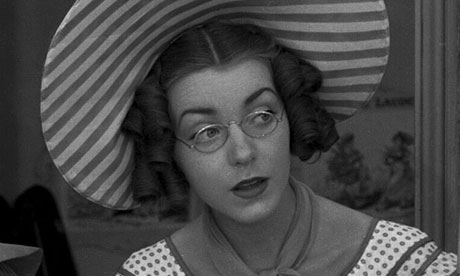 Disgruntled … Marsha Hunt as Mary Bennet in the 1940 film. Photograph: Rex Features
Disgruntled … Marsha Hunt as Mary Bennet in the 1940 film. Photograph: Rex Features
Dear Miss Austen,
"You have delighted us long enough," you made Father say in front of the whole world. Everyone knows this putdown: it's nearly as famous as your witticism about everyone thinking rich men need wives. Typical malice. Yes, malice. How would you describe a person with an adoring sister and admiring father creating a child despised by father and siblings? If only characters could sue their creators, I'd have your £110 off you – and more!
So why did you do it? Clearly you can't stand aspiring girls, especially plain ones. I work "hard for knowledge and accomplishments". Yet you pick on me continually. But of course you're just being conventional – as usual! We all mock bluestockings, such easy targets. The wonderful Mary Wollstonecraft wanted girls to study and have careers. But you'll have none of it. All your pretty girls are untaught: sister Lizzie, of course; Emma with her reading lists; imbecilic Catherine Morland. If Father had fallen under a carriage before Lizzie married money, only I could have earned my living. But that carries no weight with you.
Father takes every chance to ridicule. "What say you, Mary? For you are a young lady of deep reflection, I know, and read great books and make extracts." According to you I wanted to "say something very sensible, but knew not how". At least you gave me the hide of a rhinoceros.
I have some pleasures, though always spoilt by sneering Father and his pet, Lizzie – I don't count those giggling idiots, Kitty and Lydia. I play well, and of course at Netherfield I perform. While I play, Lizzie squirms and rolls her eyes at Father, who, obedient to his favourite, barks at me. I do what I have to do: pretend not to hear. But you are there too, Miss Austen: everyone, you write, likes Lizzie's playing better, though she's less skilled. Nothing to do with the fine eyes, I suppose?
And what about cousin Collins? You're nasty to him too – though at least you made him funny. You know he'd have suited me. He'd come to marry one of us. But Father and Lizzie blow the whole scheme out of the water for the sake of a joke about Mama not speaking to Lizzie if she doesn't marry Mr Collins, and Father not speaking to her if she does. So complacent and rude are they that no one thinks to give me my chance. Yet I'd have liked playing music in church and writing my husband's sermons. If they'd thought for a moment, I'd have saved them all a deal of trouble, and Lizzie wouldn't have had to run after Darcy in Derbyshire in that shameless way she did.
We don't choose our creators or our parents. If I had a choice, I'd be very happy with Miss Brontë. I feel myself much suited for Jane Eyre.
Yours
MB
Disgruntled in Meryton
Janet Todd is the editor of The Cambridge Companion to Pride and Prejudice (Cambridge University Press)
Lucy Mangan on Charlotte Lucas
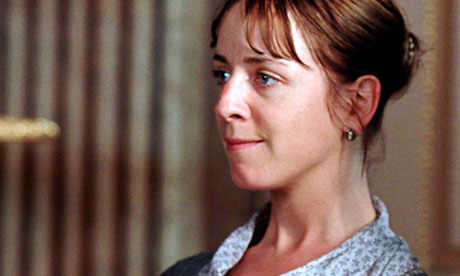 Claudie Blakley as Charlotte Lucas in the 2005 film. Photograph: Rex Features
Claudie Blakley as Charlotte Lucas in the 2005 film. Photograph: Rex Features
The older I get, the more I admire the pragmatist. Romance is fine in books – although even brilliant, bold, spiky Elizabeth is right at the edge of what my cankered soul can tolerate in a love‑blind, lovestruck heroine, and don't get me started on her demented descendant Bridget Jones. But I took, then and now, Jane Austen to be not so much a pleasant few hours' diversion but a manual for life, and looked beyond the dazzling protagonists for better guides through it.
Step forward, then, Charlotte Lucas, you magnificently clear-eyed, steel‑spined, iron-willed creature who, while everyone else is mooning over dance partners, parsing glances and bobbing curls hither and thither, is taking a cold, hard, dispassionate look at her situation and making a reckoning of the fates to come. Knowing that she is, at 27, on the very brink of spinsterhood and with no looks or fortune that will retard her progress towards it, she chooses to become the wife of Mr Collins, rather than live as an unwanted burden on whichever of her brothers ends up taking her in.
Personally I would take draining my brothers' resources or starving in a garret if familial bonds of duty and obligation failed (and yes, John Dashwood, I'm looking at you, you sod) or were abruptly severed by their untimely deaths and inadequate will provisions, over marriage to Mr Collins. I even suspect that if Charlotte had truly known what marriage to a man so teeth-gnashingly awful really meant – in a way that no woman without the experience of going out with, let alone sleeping with, someone inappropriate can – she would have made a different choice.
But she applies such knowledge of herself, of others, and of life as she has in a determinedly rational manner, and then sets out to manage the consequences as best she can for the rest of her life. She "did not seem to ask for compassion", as Elizabeth notes at the end of her first visit to the marital bower. Austen twists the knife in the more experienced reader's heart by adding: "Her home and her housekeeping, her parish and her poultry, and all their dependent concerns, had not yet lost their charms", leaving us to envisage the desolate inner landscape Charlotte will have to survey for the decades after they fade. But I have faith – I have to have faith – that the former Miss Lucas will find a way to rationalise her sufferings and draw comfort from the knowledge that this is at least the fate she chose, rather than drifted into.
We are supposed, in romantic fiction and in life generally, to admire those who let instinct guide them, who let their hearts rule their heads. But it is a dangerous precedent to set in the former, and even more dangerous practice in the latter. Charlotte, standing calm and still in the middle of all the flap and pother – the Bennets should award her a special stipend just for advising Elizabeth not to be so bloody rude to Darcy every time she speaks to him (I paraphrase) – and gazing with a cool, appraising eye on her own and everyone else's best chance of the greatest happiness while everyone else's vision is either blinkered with pride, blurred by prejudice or occluded by simple stupidity (Lydia! Mrs B!) offers a valuable, if not ideal, corrective. I cleaved to her as a teenager and I cleave to her now. And if part of me wants to rewrite the implied end of her story so that she and Lady Catherine end up having an affair and the shock of the revelation kills Mr Collins, leaving his affairs in a state that contrives to return the Bennets' estate to them while Lady C sells Rosings and moves herself and Charlotte to Bridport where they open a boutique hotel for Georgian lesbians and die happy at the age of 110, well – who's to say I'm wrong?











